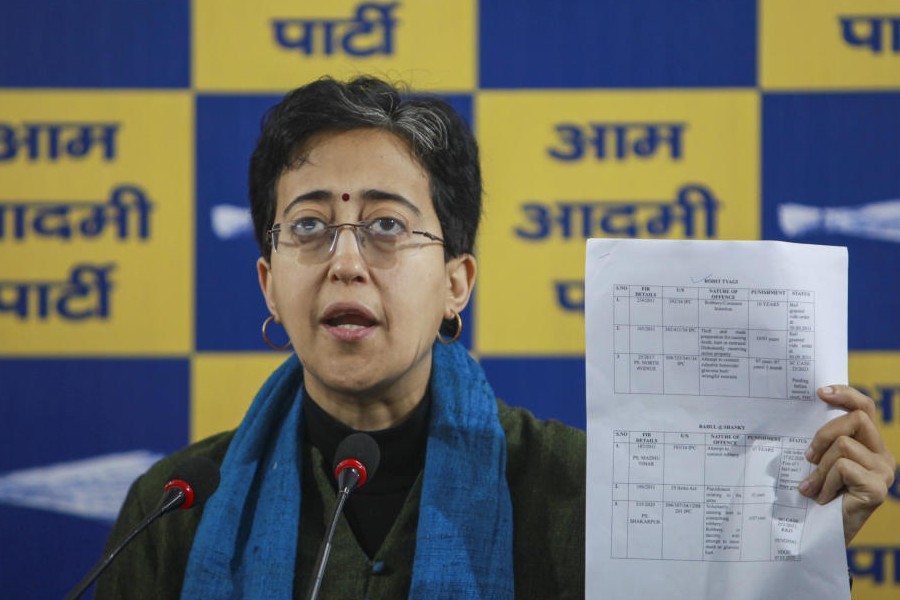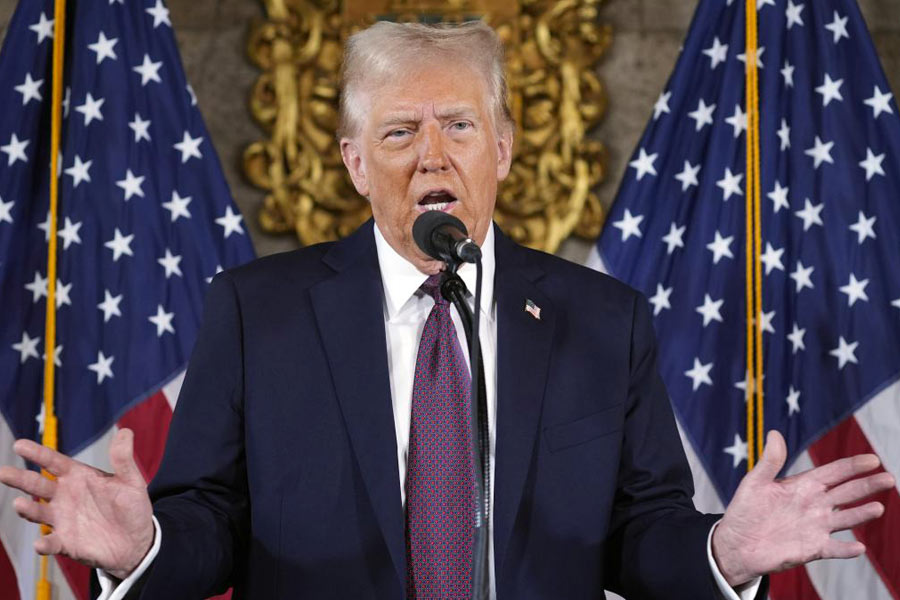-

Born again: A Sanskrit camp conducted by Samskrita Bharati at a village in Jammu
The office of Samskrita Bharati in Delhi is nondescript enough. There are some standard issue tables and chairs placed along bare walls, a few computers, and a small group of men who go about their work quietly. It's when you hear them talk that you do a doubletake. They speak to each other in Sanskrit; when they pick up the phone, they say 'Hari Om' (instead of 'hello'), and quaintly — and somewhat charmingly — address a female visitor as 'Mahodaya'.
The mood here is upbeat today. The human resource development ministry has announced that German (and other foreign languages) can no longer be taken as a third language in Kendriya Vidyalayas (KVs) and students will have to switch to Sanskrit instead. 'It's a step in the right direction,' says Dinesh Kamath, all-India organising secretary of Samskrita Bharati, an NGO that works for the revival of Sanskrit and has close links with the Rashtriya Swayamsevak Sangh. 'Sanskrit is the mother of all Indian languages. Children need to study it because it will link them to our culture.'
The HRD ministry's move came in the wake of a public interest litigation filed by the Sanskrit Shikshak Sangh (SSS), an association of Sanskrit teachers, which says that the teaching of a foreign language in schools is unconstitutional. 'The three-language formula mandated by the Constitution relates only to Indian languages,' says D.K. Jha, president, SSS. 'You cannot teach German or any other foreign language as the third language.'
It's not yet a done deal, of course — on Friday the Supreme Court admitted a petition from parents and asked the Centre to explain its decision to replace German with Sanskrit.
The point is that in the Hindi belt at least, if you stop the KVs from offering a foreign language as the third language (most students do study German as the KVs have had an arrangement with Goethe Institut-Max Mueller Bhavan since 2011), the only alternative is Sanskrit. That's because there simply aren't enough takers for other Indian languages like Bengali or Tamil in these parts. So in effect, by scrapping German, the government is making it mandatory for children to study Sanskrit as their third language in Classes VI, VII and VIII. And the same norm could well be applied to all CBSE schools in time to come.
Few would quarrel with the idea of teaching — or learning — a classical language as rich and elegant as Sanskrit — the language of Kalidasa and Kautilya, of Meghadootam and Arthashastra. The question is, should it be made compulsory? And should the rationale for teaching Sanskrit be caught up with the idea of instilling 'sanskaar' and 'sanskriti' — traditional values and culture — in children?
Ask any Sanskrit scholar and he or she will insist that children should learn the language because it is intrinsic to our Indianness. 'Sanskrit is not just a language, it is a vehicle of our culture. You cannot be a real Indian if you don't know Sanskrit,' says Professor C. Upender Rao, chairperson, Special Centre for Sanskrit Studies at Jawaharlal Nehru University, Delhi. Agrees Professor Srinivasa Varakhedi, vice-chancellor of Karnataka Sanskrit University, 'If you are not rooted in Sanskrit, you are de-rooted from our culture.'
That is a problematic assertion as Sanskrit is inevitably associated with Hinduism and Hindu culture. Hence, making its study mandatory in schools could be interpreted as an attempt to impose the cultural hegemony of a particular religion on the entire country. Of course, the scholars scoff at the notion and say that the ancient language is not bound to any one religion. 'Sanskrit always speaks for everybody. It is rooted in the concept of vasudhaiva kutumbakam — the world is your family,' says Rao.
But some Sanskrit supremacists go a step further and say that the study of the language gives you better values. 'It teaches you life skills. It teaches you about love and affection... Girls don't go astray,' says S. Padmanabhan, head of the department of Sanskrit, Madras University. 'There is zero per cent divorce and suicides among people who have learnt Sanskrit,' claims Jha, seemingly in possession of statistics that would interest psychologists and social scientists alike.
And of course, all of them want the language to be made compulsory at the school level, with Kamath going so far as to insist that it should be taught right from Class I.
There is an element of linguistic fundamentalism here that has many educationists worried. And some feel that the government's decision to replace German with Sanskrit in the KVs could fuel the trend even more. Says Arjun Dev, historian and formerly professor with the National Council of Educational Research and Training. 'By denying children the opportunity to learn a modern foreign language and making them learn Sanskrit instead, they are promoting educational obscurantism. Replacing German with Sanskrit, a language that has no relevance in day-to-day life, makes no sense.'
Sanskrit scholars would beg to differ. They speak passionately about how so many scientific and mathematical concepts — including that of 'zero' and 'pi' — are contained in Sanskrit treatises written by our ancients. Moreover, Varakhedi points out that since Sanskrit is widely regarded as a language with the most scientific structure, exposure to it also trains a child's mind. 'It gives you the power to learn anything,' he says.
Perhaps. But does that mean it ought to be pushed down the throats of those who may wish to study something else — perhaps even a foreign language? After all, the latter could be considered more useful for the child's future career. 'If we want our children to become global citizens, what better way for them to get an understanding of another culture than to learn its language,' asks Ameeta Mulla Wattal, principal of Delhi's Springdales School, which currently has 298 children studying German as their third language, while 244 have opted for French and 114 for Sanskrit.
Wattal feels that if the three language formula in the Constitution does entail only Indian languages, perhaps it is time the Constitution were amended. 'After all, democracy is all about choices,' she says.
That relates to career choices as well. Students and their parents are bound to take into account the fact that other than academics and the civil services, a Sanskrit graduate has few career opportunities. Kunal Sen, senior vice-president, Team Lease Services, a recruitment agency, says they do not receive queries from Sanskrit graduates; nor do companies ask for them.
Interestingly, even if some students go on to take up Sanskrit as their second or first language after studying it as a third (which is what Sanskrit ideologues are hoping they will do more and more), many of them do so purely because it's a scoring subject. Chaitali Kundu opted for Sanskrit as her second language in her Class X and Plus 2 simply to improve her aggregate in the board exams. A Delhi girl, she went on to study engineering and then got an MBA and is now working with a management consultancy firm. 'I don't have any connection with Sanskrit anymore,' she shrugs.
Still, Sanskrit evangelists are making a concerted effort to expand its reach and influence — and do away with its esoteric image. Samskrita Bharati, which has 3,000 centres all over India, holds Sanskrit Sambhashana Shiviram (spoken Sanskrit camps) where they promise to teach you to speak the language in 10 days. 'We have held more than one lakh such camps already,' says Kamath. The institution publishes a monthly magazine in the language and is also spearheading projects to develop a dictionary of Sanskrit that includes words coined to reflect modern terms and objects like computers or cars and so on. (Kamath says 'car' in Sanskrit may be called 'carayanam'!)
No doubt, any effort to revive and rekindle interest in a classical language such as Sanskrit ought to be welcomed. But imposing it on anyone at any stage may run counter to the mantra of 'sarve bhavantu sukhinah (let everyone be happy)' that is so intrinsic to Sanskrit and its value system.
Sanskrit Sutra
There are about 5,000 gurukuls and toles (traditional Sanskrit schools) in India
Most gurukuls teach only Sanskrit and many of them do not go for a recognised degree
Sanskrit is taught in 120 universities in the country
Career avenues: academics and the civil services
Sanskrit teachers want the subject to be made compulsory in schools and Sanskrit departments set up in every central university











